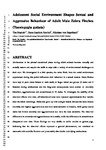Social experience during adolescence influences how male zebra finches (Taeniopygia guttata) group with conspecifics
| dc.contributor.author | Ruploh, T | |
| dc.contributor.author | Bischof, H-J | |
| dc.contributor.author | von Engelhardt, N | |
| dc.date.accessioned | 2018-02-16T14:58:53Z | |
| dc.date.available | 2018-02-16T14:58:53Z | |
| dc.date.issued | 2014-04 | |
| dc.identifier.issn | 0340-5443 | |
| dc.identifier.issn | 1432-0762 | |
| dc.identifier.uri | http://hdl.handle.net/10026.1/10801 | |
| dc.description.abstract |
Group-living animals rely on social skills which ensure beneficial interaction and prevent harmful ones with conspecifics. In a previous experiment, we demonstrated that male zebra finches reared in groups during adolescence show consistently less courtship and aggressive behaviour as adults than pair-reared males. Here we tested whether such differences affect how they group with conspecifics, as an indicator of their social integration. Zebra finches were kept in pairs (male-female or male-male) or mixed-sex groups (three males and three females) during adolescence and were introduced to an established group of unknown conspecifics during adulthood. Male courtship and aggressive behaviour were quantified directly after introduction to the group and 48 h later. At the same time, male position in relation to other birds and the number of birds in proximity were recorded. Males that grew up in a small mixed-sex group during adolescence spent more time within groups, were observed in bigger groups and lost less weight than males raised in pairs, indicating that an enriched social environment during early development may facilitate social integration. However, we observed no differences in courtship and aggressive behaviour that could predict the differences in grouping behaviour of pair- and group-reared males. We discuss alternative explanations for the difference in grouping and how to test these in future research. © 2013 Springer-Verlag Berlin Heidelberg. | |
| dc.format.extent | 537-549 | |
| dc.language | en | |
| dc.language.iso | en | |
| dc.publisher | Springer Science and Business Media LLC | |
| dc.subject | Social competence | |
| dc.subject | Social integration | |
| dc.subject | Social experience | |
| dc.subject | Adolescence | |
| dc.subject | Phenotypic plasticity | |
| dc.subject | Gregariousness | |
| dc.title | Social experience during adolescence influences how male zebra finches (Taeniopygia guttata) group with conspecifics | |
| dc.type | journal-article | |
| dc.type | Article | |
| plymouth.author-url | https://www.webofscience.com/api/gateway?GWVersion=2&SrcApp=PARTNER_APP&SrcAuth=LinksAMR&KeyUT=WOS:000332979400002&DestLinkType=FullRecord&DestApp=ALL_WOS&UsrCustomerID=11bb513d99f797142bcfeffcc58ea008 | |
| plymouth.issue | 4 | |
| plymouth.volume | 68 | |
| plymouth.publication-status | Published | |
| plymouth.journal | Behavioral Ecology and Sociobiology | |
| dc.identifier.doi | 10.1007/s00265-013-1668-5 | |
| plymouth.organisational-group | /Plymouth | |
| plymouth.organisational-group | /Plymouth/Faculty of Health | |
| plymouth.organisational-group | /Plymouth/Faculty of Health/School of Psychology | |
| plymouth.organisational-group | /Plymouth/Faculty of Science and Engineering | |
| plymouth.organisational-group | /Plymouth/REF 2021 Researchers by UoA | |
| plymouth.organisational-group | /Plymouth/REF 2021 Researchers by UoA/UoA04 Psychology, Psychiatry and Neuroscience | |
| plymouth.organisational-group | /Plymouth/Users by role | |
| plymouth.organisational-group | /Plymouth/Users by role/Academics | |
| dc.identifier.eissn | 1432-0762 | |
| dc.rights.embargoperiod | Not known | |
| rioxxterms.versionofrecord | 10.1007/s00265-013-1668-5 | |
| rioxxterms.licenseref.uri | http://www.rioxx.net/licenses/all-rights-reserved | |
| rioxxterms.type | Journal Article/Review |


